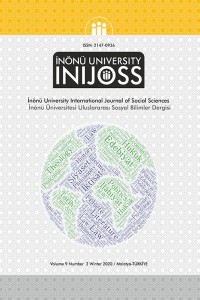Öz
Bernard Malamud’un God’s Grace adlı romanı, bilim insanı Calvin Cohn ve bir grup maymunun hayatta kalan tek canlılar olduğu, kıyamet sonrası bir senaryo üzerine kurgulanmıştır. Bu çalışma, Cohn’un sığındığı adanın yerlisi olan maymunlar üzerinde hakimiyet kurmasından yola çıkarak, romanı bir sömürgeleştirme süreci alegorisi olarak değerlendirmektedir. Dini ve ahlaki söyleminin aksine, Cohn yerlilerin tüm haklarını ihlal eder. Bencilliği ve maymunların doğalarını anlamadaki basiretsizliği, maymunların isyan etmesine yol açarak onu trajik bir sona sürükler. Cohn’un “içimizden biri” olarak, insanın sadece başkasını değil, kendi kendisini de yok etme potansiyeline sahip olduğunu en iyi şekilde örneklediği sonucuna varılmıştır.
Anahtar Kelimeler
Bernard Malamud God’s Grace adlı roman sömürgecilik sonrası egzotizm
Kaynakça
- Avery, E., (2001), The Magic Worlds of Bernard Malamud, Ed. Evelyn Avery, State University of New York Press, USA.
- Freese, P., “Surviving the End: Apocalypse, Evolution, and Entropy in Bernard Malamud, Kurt Vonnegut, and Thomas Pynchon”, Critique, Spring 1995, (3), pp. 163-175.
- Forsdick, C., “Travelling Concepts: Postcolonial Approaches to Exoticism”, Paragraph, November 2001, (Vol. 24 Issue 3), pp.12-29.
- Garrison, C., (2001), “Recollecting Bernie: Collagues at Oregon State”, The Magic Worlds of Bernard Malamud, Ed. Evelyn Avery, State University of New York Press, USA.
- Lemon, R., “Imperial Mystique and Empricist Mysticism: Inner Colonialism and Exoticism in Musil’s Törless”,Modern Austrian Literature, 2009, (Vol.42,no.1), pp.1-22.
- Lindenbaum, Shirley. “Thinking about Cannibalism.” Annual Review of Anthropology, 2004, (Vol. 33), pp. 475-498. Luhrmann, T.M. ―The Good Parsi: the Postcolonial 'Feminisation of a Colonial Elite. Royal Anthropological Institute of Great Britain and Ireland 29 (1994): pp. 333-357.
- Malamud, B., (1989). God’s Grace. Farrar Straus, New York.
- May, B., “Extravagant Postcolonialism: Ethics and individualism in Anglophonic, Anglocentric Postcolonial Fiction; or ‘What was (This) Postcolonialism?” ELH 2008, (75), p.p. 899-937.
- Munro, M. “Wild Thing: Noble Savages, Exoticisms and Postcolonial Space in Jacques-Stephen Alexis’s Les Arbres Musiciens.” French Studies, 2003, (Vol.LVII, No. 1), p.p.55-67. Shaw, M. U., (2000), Ethnic Identities in Bernard Malamud’s Fiction. Universidad De Oviedo, Spain.
- www.times.com/books/97/09/28/reviews/malamud-obit.html
- Zucker, D. J. “Malamud as Modern Midrash”, Judaism, Spring (94, Vol. 43, Issue 2), p.p. 159-171.
Öz
In his novel God’s Grace, Bernard Malamud depicts a post-apocalyptic world, the only survivors of which are Calvin Cohn, a scientist, and a group of apes. Depending on Cohn’s domineering attitude over the apes, natives of the island where he finds refuge, this study reads the novel as a work allegorising the colonisation process. Despite his religious and moral discourse, Cohn violates the native’s rights. His selfishness and failure in understanding the apes in their natural context lead him to a tragic end when apes rebel against him. It is concluded that as the “everyman”, Cohn represents men’s potential for destruction of not only others but also themselves, regardless to former tragic experience.
Anahtar Kelimeler
Kaynakça
- Avery, E., (2001), The Magic Worlds of Bernard Malamud, Ed. Evelyn Avery, State University of New York Press, USA.
- Freese, P., “Surviving the End: Apocalypse, Evolution, and Entropy in Bernard Malamud, Kurt Vonnegut, and Thomas Pynchon”, Critique, Spring 1995, (3), pp. 163-175.
- Forsdick, C., “Travelling Concepts: Postcolonial Approaches to Exoticism”, Paragraph, November 2001, (Vol. 24 Issue 3), pp.12-29.
- Garrison, C., (2001), “Recollecting Bernie: Collagues at Oregon State”, The Magic Worlds of Bernard Malamud, Ed. Evelyn Avery, State University of New York Press, USA.
- Lemon, R., “Imperial Mystique and Empricist Mysticism: Inner Colonialism and Exoticism in Musil’s Törless”,Modern Austrian Literature, 2009, (Vol.42,no.1), pp.1-22.
- Lindenbaum, Shirley. “Thinking about Cannibalism.” Annual Review of Anthropology, 2004, (Vol. 33), pp. 475-498. Luhrmann, T.M. ―The Good Parsi: the Postcolonial 'Feminisation of a Colonial Elite. Royal Anthropological Institute of Great Britain and Ireland 29 (1994): pp. 333-357.
- Malamud, B., (1989). God’s Grace. Farrar Straus, New York.
- May, B., “Extravagant Postcolonialism: Ethics and individualism in Anglophonic, Anglocentric Postcolonial Fiction; or ‘What was (This) Postcolonialism?” ELH 2008, (75), p.p. 899-937.
- Munro, M. “Wild Thing: Noble Savages, Exoticisms and Postcolonial Space in Jacques-Stephen Alexis’s Les Arbres Musiciens.” French Studies, 2003, (Vol.LVII, No. 1), p.p.55-67. Shaw, M. U., (2000), Ethnic Identities in Bernard Malamud’s Fiction. Universidad De Oviedo, Spain.
- www.times.com/books/97/09/28/reviews/malamud-obit.html
- Zucker, D. J. “Malamud as Modern Midrash”, Judaism, Spring (94, Vol. 43, Issue 2), p.p. 159-171.
Ayrıntılar
| Birincil Dil | İngilizce |
|---|---|
| Bölüm | Makaleler |
| Yazarlar | |
| Yayımlanma Tarihi | 31 Aralık 2020 |
| Gönderilme Tarihi | 14 Mayıs 2020 |
| Yayımlandığı Sayı | Yıl 2020 Cilt: 9 Sayı: 2 |


